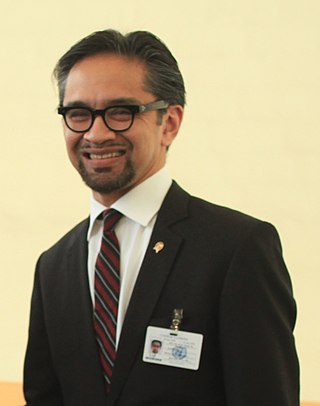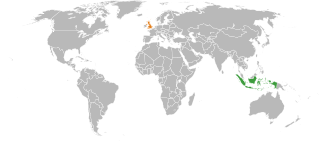
Tirtayasa (1631–1695), complete stylized name Sultan Ageng Tirtayasa, also known as Ageng and Abulfatah Agung, was the sixth sultan of Banten and reigned during the kingdom's golden age.

The Banten Sultanate was a Bantenese Islamic trading kingdom founded in the 16th century and centred in Banten, a port city on the northwest coast of Java; the contemporary English name of both was Bantam. It is said to have been founded by Sunan Gunungjati, who had previously founded Cirebon.

Raden Mohammad Marty Muliana Natalegawa, is an Indonesian diplomat and was the Minister for Foreign Affairs in the Second United Indonesia Cabinet. He served as Indonesia's Permanent Representative to the United Nations from 5 September 2007 until his latest appointment and has also served as the Indonesian Ambassador to the United Kingdom and as a spokesman for the Ministry of Foreign Affairs of the Republic of Indonesia.

India and Indonesia established diplomatic relations on 16 April 1949. Both countries are neighbours, India's Andaman and Nicobar Islands share a maritime border with Indonesia along the Andaman Sea.

Hungary–Indonesia relations refer to bilateral relations between Hungary and Indonesia. The two countries established diplomatic relations in 1955. A Hungarian embassy was opened in Jakarta in 1957. In line to Hungarian "Eastern Opening" policy, and due to Indonesian political weight and market potentials, Hungary considered Indonesia as one of the most influential states in the ASEAN. While Indonesia sees Hungary as a potential market and a strategic entrance to penetrate the markets of Central Europe and Eastern Europe. Hungary has an embassy in Jakarta, while Indonesia has an embassy in Budapest.

Argentina and Indonesia established diplomatic relations in 1956. Since then, bilateral relations between both countries have become increasingly more strategic. According to Argentine Ambassador to Indonesian Javier A. Sanz de Urquiza, Indonesia has been a "true friend of Argentina" over the Falkland Islands sovereignty dispute. Argentina has an embassy in Jakarta, while Indonesia has an embassy in Buenos Aires. Both countries say they share the same values regarding the international order, and the same aspiration to defend the developing nations' interest in international forum. Both countries are members of Group of 77, the G-20 major economies, the G20 developing nations, and Forum of East Asia-Latin America Cooperation.

Indonesia and the United Kingdom established diplomatic relations in 1949 and have maintained strong relations since then. Indonesia has an embassy in London while the United Kingdom has an embassy in Jakarta. The United Kingdom considers Indonesia an increasingly important partner globally and is committed to efforts to take bilateral relations to new heights. Both nations are members of G-20 major economies.

Indonesia and the Netherlands share a special relationship, embedded in their shared history of colonial interactions for centuries. It began during the spice trade as the Netherlands established the Dutch East Indies Company (VOC) trading post in what is now Indonesia, before colonising it as the Dutch East Indies until the mid-20th century. Indonesia was the largest former Dutch colony. In the early 21st century, the Dutch government has committed to boosting its relationship with Indonesia, noting that economic, political, and interpersonal contacts should be further strengthened.

Indonesia and South Korea established diplomatic relations in 1973. Both countries share a common vision, values and the will to contribute to the international community as middle powers. Both countries are members of G-20 and APEC. South Korea has an embassy in Jakarta and Indonesia has an embassy in Seoul. According to a 2014 BBC World Service Poll, 48% of Indonesians view South Korea's influence positively, with 27% expressing a negative view. The Chinese Indonesian merchant Chen Yanxiang visited Korea between the 1390s and the 1410s, the first major contact between the two nations.

Indonesia and the United Arab Emirates (UAE) established diplomatic relations in 1976. The diplomatic relations are important because both share the solidarity as Muslim majority countries. Indonesia has an embassy in Abu Dhabi, while the United Arab Emirates has an embassy in Jakarta. Both countries are members of the World Trade Organization (WTO),Non-Aligned Movement and Organisation of Islamic Cooperation (OIC).

Indonesia and Nigeria established diplomatic relations on 5 March 1965. Both countries are members of multilateral organizations such as the Non-Aligned Movement, World Trade Organization (WTO), Organisation of Islamic Cooperation (OIC) and Developing 8 Countries. Indonesia has an embassy in Abuja and Nigeria has an embassy in Jakarta.

Brazil and Indonesia established diplomatic relations in 1953. Both are large tropical countries endowed with rich natural resources, Brazil and Indonesia possess the largest tropical rain forest of the world that contains the world's richest biodiversity, which gave them a vital role in global environment issues, such as ensuring tropical forests protection. Both countries lead the list of Megadiverse countries with Indonesia second only to Brazil.

The nations of Indonesia and Mexico established diplomatic relations in 1953. Both nations view their counterpart as strategic partners in each other's regions; Indonesia in Southeast Asia and Mexico in Latin America. Both nations are mutual members of the Asia-Pacific Economic Cooperation, Forum of East Asia-Latin America Cooperation, Group of 15, G20, MIKTA, United Nations, and the World Trade Organization.

Indonesia and Spain established diplomatic relations in 1958. Spain identifies Indonesia as their natural ally and has named Indonesia as one of their priority nations in their foreign relations with the Asia-Pacific region. Indonesia has an embassy in Madrid, while Spain has an embassy in Jakarta and a consulate in Seminyak, Bali. Today, the cooperation has expanded to various fields, including trade, culture, education, and defense technology.

Austria and Indonesia established diplomatic relations on 20 November 1954. Austria recognizes Indonesia as a stable and reliable partner, and both countries enjoy excellent relations. The two nations have agreed to expand relations in business, trade and investment, tourism, culture, environment and green technology. Austria has an embassy in Jakarta and honorary consulates in Yogyakarta, Bandung and Surabaya, while Indonesia has an embassy in Vienna that is also accredited to Slovenia.

Indonesia and Sweden established diplomatic relations on 23 November 1950. In recent years both nations demonstrate growing keenness to improve bilateral relations, as each head of government exchanged visits. Indonesia has an embassy in Stockholm that also accredited to Latvia, while Sweden has an embassy in Jakarta that also accredited to East Timor.

Bosnia and Herzegovina–Indonesia relations refers to the bilateral relations between Bosnia and Herzegovina and Indonesia. Bosnia and Herzegovina has an embassy in Jakarta, while Indonesia has an embassy in Sarajevo. The bilateral relations was initially motivated by humanity and religious solidarity. As a nation with the largest Muslim population, Indonesians were shocked by the ethnic cleansing against Muslim Bosniaks during the Bosnian War, and promptly organized and mobilized help. Indonesian support for Bosnia and Herzegovina ranged from collecting donations, sending peacekeeping forces under United Nations, to building the Istiqlal Mosque in Sarajevo.

Ecuador–Indonesia relations refer to bilateral relations between Ecuador and Indonesia. Relations were established on 29 April 1980; however, it was not until November 2004 that Ecuador established its embassy in Jakarta, and reciprocating 6 years later on November 11, 2010, that Indonesia finally opened its embassy in Quito. Both countries are the members of Forum of East Asia-Latin America Cooperation and Non-Aligned Movement.

Indonesia and Norway established diplomatic relations on 25 January 1950. Since then, Indonesia and Norway has been cooperating in areas, such as climate and energy, democracy and human rights, international political issues and trade. Both nations has agreed to establish a strategic partnership against poverty and climate change, and also in promoting democracy and tolerance. Indonesia has an embassy in Oslo, while Norway has an embassy in Jakarta.

Indonesia–Mongolia relations refer to foreign relations between Indonesia and Mongolia since 1956. Both countries are members of the Asia Cooperation Dialogue, Forum of East Asia-Latin America Cooperation, Non-Aligned Movement, World Trade Organization and the United Nations.






















